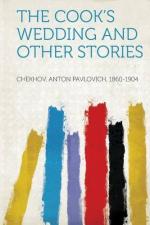The priest’s voice is audible: “And I, unworthy priest . . .”
Now I too move behind the screen. I do not feel the ground under my feet, it is as though I were walking on air. . . . I go up to the lectern which is taller than I am. For a minute I have a glimpse of the indifferent, exhausted face of the priest. But after that I see nothing but his sleeve with its blue lining, the cross, and the edge of the lectern. I am conscious of the close proximity of the priest, the smell of his cassock; I hear his stern voice, and my cheek turned towards him begins to burn. . . . I am so troubled that I miss a great deal that he says, but I answer his questions sincerely in an unnatural voice, not my own. I think of the forlorn figures of the Holy Mother and St. John the Divine, the crucifix, my mother, and I want to cry and beg forgiveness.
“What is your name?” the priest asks me, covering my head with the soft stole.
How light-hearted I am now, with joy in my soul!
I have no sins now, I am holy, I have the right to enter Paradise! I fancy that I already smell like the cassock. I go from behind the screen to the deacon to enter my name, and sniff at my sleeves. The dusk of the church no longer seems gloomy, and I look indifferently, without malice, at Mitka.
“What is your name?” the deacon asks.
“Fedya.”
“And your name from your father?”
“I don’t know.”
“What is your papa’s name?”
“Ivan Petrovitch.”
“And your surname?”
I make no answer.
“How old are you?”
“Nearly nine.”
When I get home I go to bed quickly, that I may not see them eating supper; and, shutting my eyes, dream of how fine it would be to endure martyrdom at the hands of some Herod or Dioskorus, to live in the desert, and, like St. Serafim, feed the bears, live in a cell, and eat nothing but holy bread, give my property to the poor, go on a pilgrimage to Kiev. I hear them laying the table in the dining-room—they are going to have supper, they will eat salad, cabbage pies, fried and baked fish. How hungry I am! I would consent to endure any martyrdom, to live in the desert without my mother, to feed bears out of my own hands, if only I might first eat just one cabbage pie!
“Lord, purify me a sinner,” I pray, covering my head over. “Guardian angel, save me from the unclean spirit.”
The next day, Thursday, I wake up with my heart as pure and clean as a fine spring day. I go gaily and boldly into the church, feeling that I am a communicant, that I have a splendid and expensive shirt on, made out of a silk dress left by my grandmother. In the church everything has an air of joy, happiness, and spring. The faces of the Mother of God and St. John the Divine are not so sorrowful as yesterday. The faces of the communicants are radiant with hope, and it seems as though all the past is forgotten, all is forgiven. Mitka, too, has combed his hair, and is dressed in his best. I look gaily at his protruding ears, and to show that I have nothing against him, I say:




